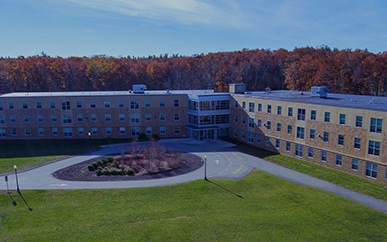PROGRAM TYPE
BSN (On Campus)
RN to BSN (Online)
DEGREES
BSN
Contact

Emily Cabrera EdD, MSN, RN
Nursing
Program Overview
Anna Maria College offers two nursing undergraduate programs. The traditional Bachelor of Science in Nursing (BSN) program is designed for pre-licensure nursing students to sit for the NCLEX-RN upon program completion and the online RN-BSN program is focused on preparing registered nurses to be professional healthcare practitioners who can provide compassionate care based on scientific evidence.
Approvals and Accreditations

The Bachelor of Science (BSN) program is approved by the Massachusetts Board of Registration of Nursing

The Baccalaureate nursing program at Anna Maria College located in Paxton, is accredited by the:
Accreditation Commission for Education in Nursing (ACEN)
3390 Peachtree Road NE, Suite 1400
Atlanta, GA 30326
(404) 975-5000
The most recent accreditation decision made by the ACEN Board of Commissioners for the baccalaureate nursing program is Continuing Accreditation.
Nursing Programs
Mission of the Nursing Program
The nursing program at Anna Maria College embodies the College’s mission and the traditions of the Sisters of St. Anne. By creating a supportive learning community for students from all backgrounds and beliefs.
Course Of Study
Philosophy of the Nursing Program
The philosophy of the Anna Maria College nursing program emanates from the faculty’s beliefs concerning nursing, client, environment, health, nursing, and teaching and learning in both the client care and nursing education settings. These beliefs are informed by and incorporate concepts from contemporary established professional nursing standards, guidelines, and competencies for baccalaureate programs.
The nursing curriculum is modelled from state and national nursing core competencies, most notably the Massachusetts Nursing Core Competencies. Integral to the curriculum are critical thinking, writing, and cultural competency. Spirituality, which fosters a religious and moral sensitivity, is a core component of compassionate nursing care and is woven throughout the curriculum as one of the five dimensions of health (spiritual dimension). Behavioral and physical sciences and liberal arts are the foundations for simple to complex problem-solving in patient care and the teaching/learning process. The curriculum incorporates a focus on advocacy in health promotion for clients and populations across the lifespan.
Faculty at Anna Maria College believe nursing is a unique profession concerned with all factors affecting clients in their environment. The function of nursing is to diagnose and treat the human response to actual or potential health problems. Nursing is concerned with the five dimensions of health; physiological, psychological, sociocultural, developmental; and, spiritual. The goal of nursing is to support the client to attain, retain, and maintain optimal wellness. We believe nursing to be dynamic and caring. Nursing is an art as well as a science that utilizes critical thinking in both independent and collaborative nursing practice. Nursing provides clients with evidence-based care through the use of the nursing process.
The client (human being) is the focus of holistic nursing care. The client may be either an individual, group or the community. Through evidence-based nursing interventions, the nurse works with clients, groups, or communities to foster optimal wellness in all dimensions of health.
Faculty conceptualize health as a continuum of wellness to illness. It is a dynamic, ever changing state determined by the degree of harmonious, balanced interaction among all dimensions of health. Health is not a perfect state, but the best possible health state for a client. When client dimension of health needs are met, a state of optimal wellness exists; conversely, unmet needs reduce the wellness state.
The environment is composed of all internal and external factors affecting or affected by the client. The environment is considered to be any setting in which nurse/client interactions take place. All internal and external factors impact each client dimension of health thereby affecting the client’s level of wellness and ability to achieve health care outcomes.
Faculty believe the teaching/learning process is dynamic and interactive and requires the active participation of the student. It occurs within the College as a whole and is a systematic approach to the acquisition of knowledge. A positive learning environment is created and endorsed by mutually respectful human behaviors within the College community: This facilitates the development of cognitive, affective, and psychomotor skills which enable the acquisition of a knowledge base for safe nursing practice. Cultural diversity is celebrated throughout the nursing curriculum. Nursing education supports the notion of lifelong learning which promotes the participation in professional nursing organizations.
The role of the nursing faculty is to facilitate learning, model professional behavior, and guide and support nursing students. Nursing faculty support the notion of active and passive learning activities in the process of students achieving program outcomes. Inherent in this commitment is a focus on the development of critical thinking skills, which is viewed as a process of the application of mental skills that renders logical shape to the gathered data. This type of thinking occurs within the context of intellectual curiosity, rational inquiry, problem-solving, and creativity in problem framing. This skill is directly applied in the nursing process.
Nurse educators choose diverse teaching strategies that facilitate the assimilation and integration of the knowledge, skills, and attitudes required for safe and effective nursing practice.
Approval and Accreditation
Bachelor of Science (BSN) Program:
The Bachelor of Science (BSN) program is approved by the Massachusetts Board of Registration of Nursing:
Massachusetts Board of Registration in Nursing (BORN)
239 Causeway Street, 2nd Floor, Suite 200
Boston, MA 02114
1 (800) 414-0168
nursing.admin@state.ma.us
Bachelor of Science (BSN) program and RN to BSN Program Options:
The Baccalaureate nursing program at Anna Maria College located in Paxton, MA, is accredited by the:
Accreditation Commission for Education in Nursing (ACEN)
3390 Peachtree Road NE, Suite 1400
Atlanta, GA 30326
(404) 975-5000
The most recent accreditation decision made by the ACEN Board of Commissioners for the baccalaureate nursing program is Continuing Accreditation.
View the public information disclosed by the ACEN regarding this program at http://www.acenursing.us/accreditedprograms/programSearch.htm.
Program Learning Outcomes
At the conclusion of the Anna Maria College Baccalaureate in Nursing Program, the graduate will be able to:
- Utilize the nursing process to manage safe and effective care across the lifespan, adapted to the client’s physiological, psychological, sociocultural, development, and spiritual dimensions of health. (Patient-Centered Care) (Safety)
- Use critical reasoning and best current evidence to make nursing practice decisions that support the client’s ability to attain, retain, and maintain optimal wellness. (Evidence-Based Practice)
- Incorporate civil, legal, ethical, and spiritual principles into the provision of socially responsible nursing care. (Professionalism)
- Communicate professionally and effectively with clients in contemporary healthcare settings and members of the healthcare team to achieve mutually determined health care outcomes. (Communication)
- Utilize contemporary information technology to communicate, facilitate, and provide care. (Informatics and Technology)
- Integrate leadership skills and principles to influence the behavior of individuals, groups, and members of the interdisciplinary healthcare team within their environment to facilitate the acquisition/ achievement of shared goals. (Leadership) (Teamwork and Collaboration)
- Apply knowledge of healthcare policy, financial and regulatory influences on health care systems to quality improvement processes that contribute to achieving cost effective, patient-centered outcomes. (Systems-Based Practice) (Quality Improvement)
- Model accountability for nursing practice decisions, with a commitment to professional growth, and life-long learning. (Professionalism)
AMC’s Nursing Education Outcomes are derived from the following professional standards and guidelines:
- AACN, Essentials of Baccalaureate Education for Professional Nursing (2008).
- American Nurses Association. (2015). Code of Ethics for nurses with Interpretive Statements.
- American Nurses Association (2015). Nursing: Scope and standards of practice.
- Commonwealth of Massachusetts 244 CMR 3.00 Registered Nurse (Nurse Practice Act).
- National Council of State Boards of Nursing (2016).
- 2016 NCLEX-RN detailed test plan.
- Accreditation Commission for Accreditation in Nursing, Inc. (2013) Accreditation manual with interpretive guidelines.
- Massachusetts Action Coalition (2016). Nursing Core Competencies.
- Quality and Safety Education for Nurses. (2007). Quality and safety competencies.










